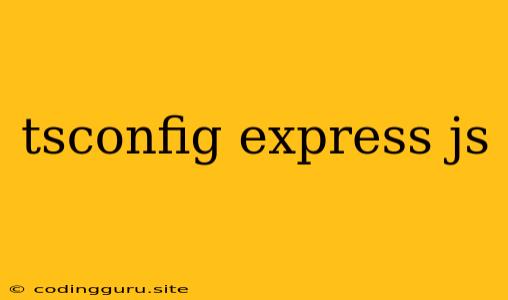Understanding tsconfig.json for Your Express.js Project
TypeScript, a superset of JavaScript, adds static typing to your code, making it more robust and easier to maintain. When working with Express.js, a popular Node.js framework, you'll want to leverage TypeScript's benefits. This is where tsconfig.json, the configuration file for TypeScript projects, comes in. It's the bridge that allows you to write your Express.js code in TypeScript and have it seamlessly compile to JavaScript.
What is tsconfig.json?
tsconfig.json is a JSON file that defines the configuration settings for your TypeScript compiler. It acts as a blueprint, guiding the TypeScript compiler on how to compile your code. Think of it as a control panel for your TypeScript project. By customizing its settings, you can influence how TypeScript compiles your code and how it interacts with other parts of your project.
Why Use tsconfig.json with Express.js?
Here's why using tsconfig.json with your Express.js project is a good idea:
- Type Safety: TypeScript's strong typing system helps you catch errors early, reducing the risk of runtime surprises.
- Improved Code Readability: With clear type definitions, your code becomes more readable and easier to understand, especially for large projects.
- Enhanced Refactoring: When you need to refactor code, TypeScript's type system can help you make changes confidently, ensuring that your code stays consistent.
- Integration with Tools: TypeScript integrates well with popular tools like IDEs and linters, making development more efficient.
Setting up tsconfig.json for Express.js
1. Create the tsconfig.json file:
If you're starting a new project, simply create a tsconfig.json file in the root of your project directory.
2. Basic Configuration:
Here's a basic tsconfig.json file:
{
"compilerOptions": {
"module": "commonjs",
"outDir": "dist",
"target": "es6",
"sourceMap": true,
"esModuleInterop": true,
"strict": true,
"noImplicitAny": true,
"moduleResolution": "node",
"resolveJsonModule": true
},
"include": [
"src/**/*"
],
"exclude": [
"node_modules"
]
}
Explanation of Important Settings:
"module": "commonjs": Specifies that the output should be in CommonJS modules, which is the standard for Node.js."outDir": "dist": This tells TypeScript to output the compiled JavaScript code to the "dist" directory."target": "es6": This sets the target JavaScript version for compilation."sourceMap": true": This enables source maps, which are helpful for debugging."esModuleInterop": true": This enables compatibility with modules using the "import/export" syntax."strict": true": This enables strict type checking, resulting in more reliable code."noImplicitAny": true": This forces you to explicitly define types, preventing unintended "any" type usage."moduleResolution": "node": This specifies the module resolution strategy used by the compiler, following Node.js's conventions."resolveJsonModule": true": This allows you to import JSON files directly using theimportkeyword.
3. Integration with Express.js:
- Install TypeScript:
npm install -g typescript - Install Type Declarations for Express:
npm install --save-dev @types/express - Create your Express.js Application: You can now create your Express.js routes and middleware using TypeScript.
Example:
// src/index.ts
import express from 'express';
const app = express();
const port = process.env.PORT || 3000;
app.get('/', (req, res) => {
res.send('Hello from TypeScript Express.js!');
});
app.listen(port, () => {
console.log(`Server is listening on port ${port}`);
});
4. Compile your Code:
Run tsc in your terminal to compile your TypeScript files. Alternatively, you can use tools like ts-node to run your TypeScript files directly without compilation.
Tips for Effective tsconfig.json Configuration:
- Experiment with Settings: Try different settings to find the optimal configuration for your project.
- Use IDEs: Many IDEs offer features for working with TypeScript, including auto-completion, type checking, and code navigation.
- Use a TypeScript Linter: Linters help you maintain code quality and adhere to best practices.
- Read the TypeScript Documentation: The TypeScript documentation is an excellent resource for understanding various tsconfig.json settings.
Conclusion:
tsconfig.json is a crucial part of any TypeScript-based Express.js project. By understanding and configuring its settings, you can unlock the power of TypeScript, making your code safer, more readable, and easier to maintain. With its robust type system and integrated tooling, TypeScript can significantly enhance the development process for your Express.js applications.
